The life and legacy of Pathmavathie Krishnavani Gounden: a beacon of culture and service
TAMIL LINGUIST
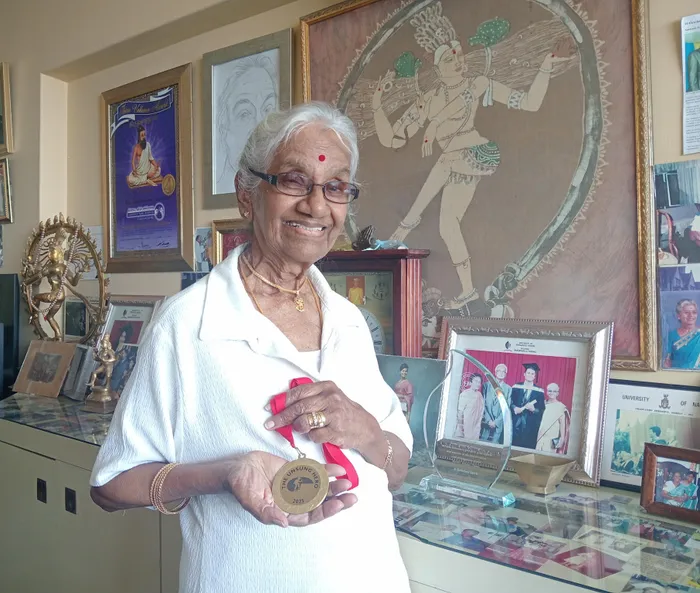
Pathmavathie Krishnavani Gounden, a Tamil linguist who served more than three decades teaching children, was honoured in the Unsung Heroes Publication Board’s newly-launched volume three of its book series, The Unsung Heroes.
Image: Nadia Khan
This Heritage Month the POST pays tribute to 86 year old Pathmavathie Krishnavani Gounden. From serving as a Tamil-language teacher for more than three decades to providing assistance to poor, homeless and terminally-ill children, Gounden stands as a monument of resilience and selfless service. In addition, she was recently honoured in the Unsung Heroes Publication Board’s volume three of its book series, The Unsung Heroes.
INSPIRED by her love for the Tamil language and culture, as well as children, Pathmavathie Krishnavani Gounden shared the beauty of it with others in her community and later through the education system, spanning more than three decades.
In addition, she made it her duty to uplift the lives of others, especially children, through the organisations she founded over the years.
The 86-year-old, of Victoria Embankment in Durban, was among 46 people honoured in the Unsung Heroes Publication Board’s volume three of its book series, The Unsung Heroes.
The book is aimed at honouring individuals who have transformed lives without seeking recognition or reward. She spoke to the POST about her journey, which began while growing up in a close-knit community in Pinetown.
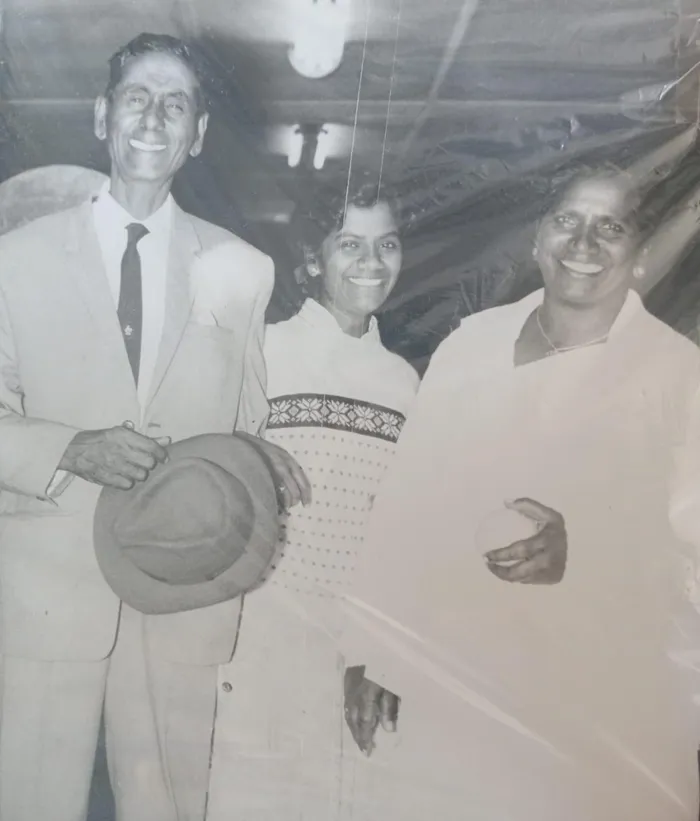
With her parents, Vadivelu Govender and Parvathie Govender.
Image: Supplied
Early days
Gounden, the third born of five children, was born on April 21, 1939. Her paternal and maternal grandparents hailed from India.
“I did not meet my father’s parents, but I met my mother’s parents who came from a village in Narasinga Puram, Arkadu, in South India. I later visited my grandfather’s home and met my relatives. It was a beautiful experience. During one of my trips, I brought back some soil from under my grandfather’s bed. This was so that my mother could keep a memory of her father.”
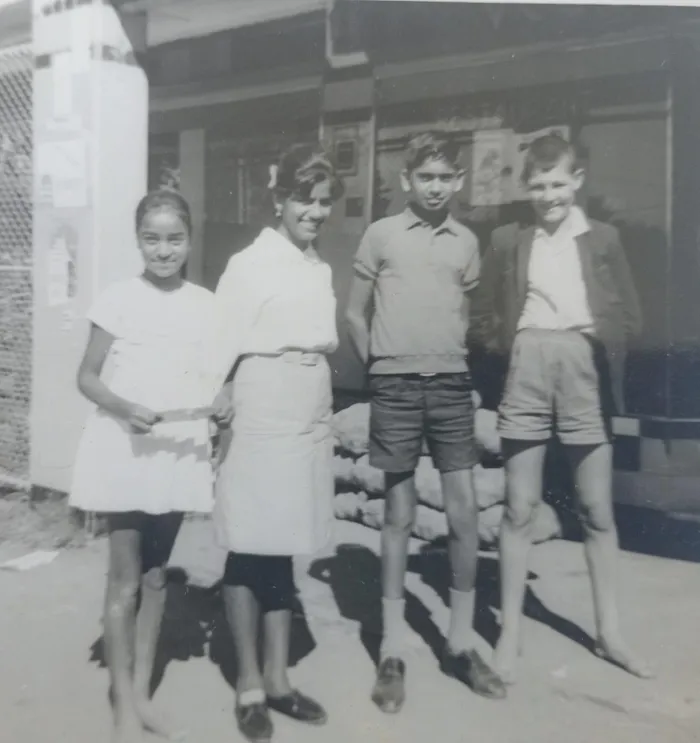
Gounden, second from left, with children from the community outside her father’s supermarket in Pinetown.
Image: Supplied
Gounden lived with her parents, siblings and cousin.
“My father, Vadivelu Govender, initially worked as a long-distance truck driver. He later started his own trucking company and opened a supermarket. My mother, Parvathie, was a businesswoman, who bid for and resold furniture at auctions at a significant profit. Then there were my siblings and cousin. She lived with us after her mother, my mother’s sister, died.
“My father, who was my everything, was known as ‘a man of all trades’. He was not only an astute businessman, but a musician and playwright. At 9 months old, I featured in a play that he wrote, directed and staged at the old Empire Cinema in Pinetown.
“Although my mother did not have a formal education, she was quite intelligent. She used her earnings to supplement my father’s income.”
Gounden recalled some of her fondest memories of growing up in Pinetown.
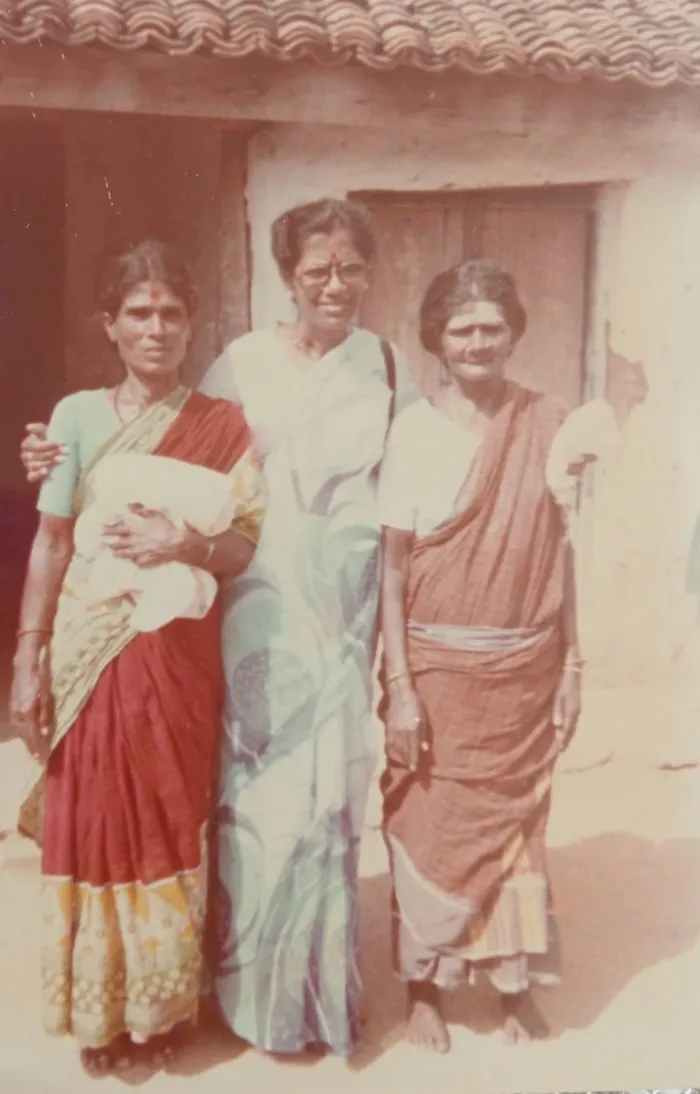
With relatives, while visiting her maternal grandfather’s home in Narasinga Puram, Arkadu in South India.
Image: Supplied
“I remember all the ammas (mothers) gathered at the river to wash clothes as we did not have running (piped) water. The children joined them. My mother used to give me my father and brothers’ socks to wash. We also had a lot of fun. We swam in the river, climbed on the rocks, and caught crabs and fish. We also climbed trees, and picked madonis fruit (Java plums) and monkey berries. They were delicious.
“Religious festivals were celebrated as a community. For the Amman Poosai (Mariamman prayer), those celebrating would put their money together and buy whatever food items were needed. We then gathered at the riverside where they cooked and performed the prayer.
“We also celebrated each another’s festivals. There was no differentiation if you were Muslim, Tamil, Hindi or Telugu-speaking. We were all family.”
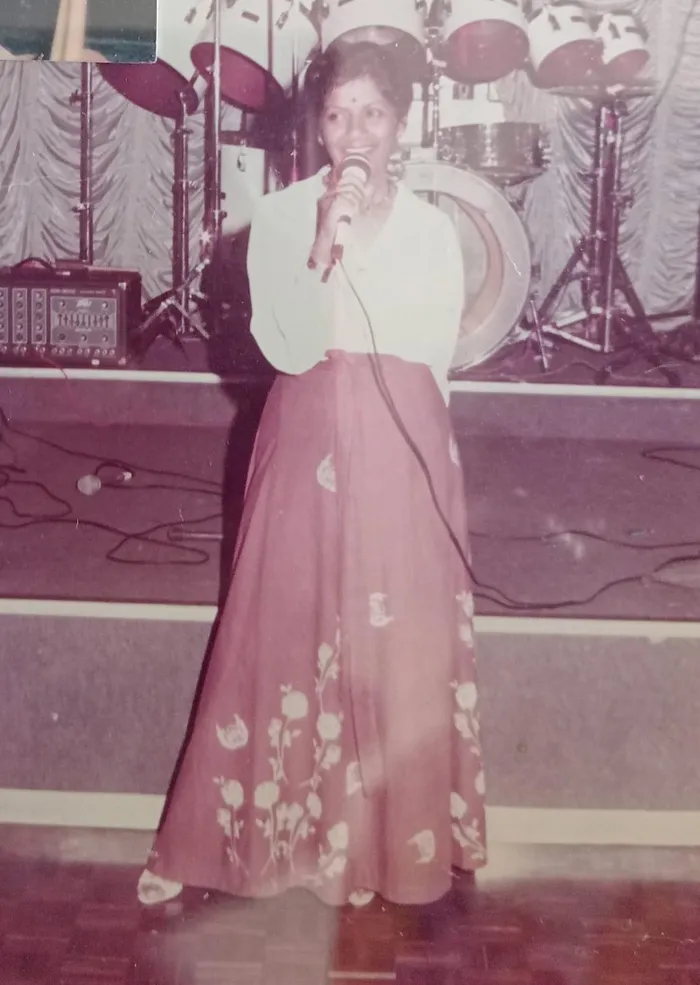
From a young age, Gounden has enjoyed singing.
Image: Supplied
Education
Gounden started Class 1(Grade 1) at the Pinetown Indian Government School, at age 6.
“However, I started going to school when I was 4. I used to cry to get my older sister to take me to school with her. I completed Standard 6 (Grade 8) at the school. I thereafter attended Standard 7 (Grade 9) at Durban Indian Girls’ High School, but six months later, my education was stopped.
“Back in the day, once a girl reached puberty, she had to leave school as it was time to take care of the home, and in some cases, get married. They used to ask: ‘What is the use of educating a girl, when she is just going to wash pots and pans?’
“I was devastated as I loved school, but I had no choice. You don’t disobey your elders. My father knew how much I loved learning, so he bought me newspapers and magazines. I read day and night. I used a paraffin lamp at night. I learnt English and Tamil. I was self-taught.”
She also taught children in the community.
“All the children gathered outside my home and I taught them English and Tamil. I also had a passion for singing and dancing, so I taught them Gommi (a traditional South Indian folk dance using hand claps), Kollaatum (a traditional South Indian folk dance using sticks with partners), and village dances. During this time, my father also opened businesses and I worked in his supermarket.”
Due to the Group Areas Act, the family was moved to Umhlatuzana in Chatsworth.
“I started volunteering at the Chatsworth Cheshire Home and was thereafter employed in the administrative department. I worked there for about two years before leaving.”
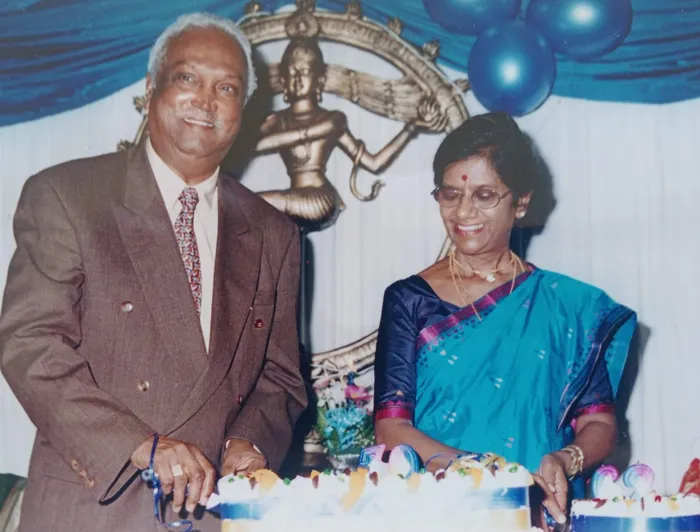
With her now late husband, Balan Gounder, who was a businessman and served as the chairperson of the Merebank Tamil Society.
Image: Supplied
Marriage
Gounden married her first husband, now late, in 1973.
“This was a year after my father passed away. Over the years, many people proposed marriage, but my father always said there was no need for me to get married, I was well taken care of. However, after his passing, the family got a proposal from a man, who was an acquaintance. He was divorced with two children. I was initially hesitant, but because of my love for children, I agreed.
“A few years later, while we were travelling to Durban from Newcastle, there was an accident and he passed away, with a friend of ours. I was devastated and returned to my parents’ home. I vowed to never get married again.
“More than 20 years later, I received another proposal from a widower with three children. He came to our home with his friend, Balan Gounder. My suitor told Balan to convince me to get married. After speaking with Balan for some time, who was also a widower with children, I realised we had the same beliefs and values, which brought us closer together. After a few years of interacting with Balan, we got married in 1993. He was a businessman and the chairperson of the Merebank Tamil School Society. We were married for almost 30 years until his death.”
The couple fund-raised and collected clothing during the onslaught of Tamils in Sri Lanka.
“We were instrumental in forming the Tamil Co-ordinating Committee in South Africa to support the issues in Sri Lanka. Many supporters were recruited into the organisation and formed a formidable delegation at the Racism Conference in Durban. We also housed members of the Tamil Eelam Tigers, a militant organisation, in our home for many months until they found alternate refuge in European countries.”
Career
Gounden said following the death of her first husband, she began teaching Tamil from the garage of her home in Umhlatuzana.
“This helped me through my grief. There was a great response, and I could barely accommodate the number of children and adults on the premises. One day, our neighbour, a teacher, approached me. He asked if I would teach Tamil at his school. He taught various subjects including Tamil and said he could not manage. I taught Tamil at Willow Park Primary School for seven years on a voluntary basis, and I then started earning about R2 an hour working three days a week.”
She also taught at Parkview Primary School with a teaching career spanning for 33 years.
“I simply loved teaching, mainly because of my love for children. They also loved me. They all wanted to be in my class. I had children of all races and religions wanting to join. Apart from teaching them Tamil, I also told them stories of our indentured history. They loved it so much, they said: ‘Akka (sister), teach us a little bit of Tamil today and tell us more stories’.”
Community impact
Gounden founded the Thamizh Magalir Munnertre Eakkum (Tamil Women's Progressive Movement), which was launched on August 9, 1998.
“The organisation aimed to uplift women and youth, socially, morally and economically. I chaired the organisation for 25 years and was appointed the lifelong president.”
In addition, she founded the Caring Hands Children's Association in 2008.
“I formed the organisation in honour of my parents to celebrate their lives of giving back as they were involved in charity work. Through the organisation, we provided food, school fees, uniforms and books to poor, homeless and terminally-ill children.”
Accolades
She has been a recipient of various awards for her humanitarian and cultural contributions, including from the Clairwood Tamil Institution and the Mount Edgecombe Mariammen Temple.
Gounden, a breast cancer survivor, having undergone a double mastectomy, as well as a hip replacement, continues her work in serving humanity and promoting culture.
“I still attend the organisation meetings and try to be active in the projects. However, nowadays I spend more time relaxing at home and being with family.”
Related Topics: